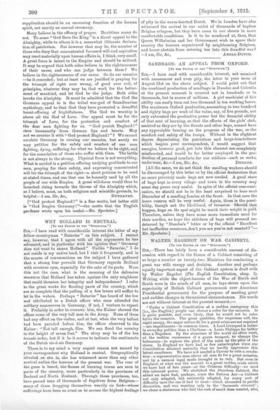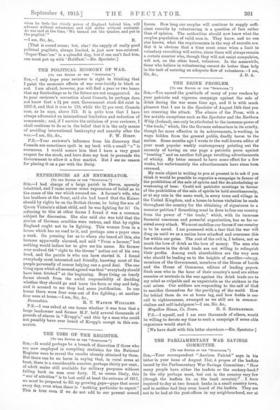WALTER BAGEHOT ON WAR CABINETS. pro mos EDITOR or THE
" SPECTATOI01
Sin,—There has lately been a considerable amount of dis- cussion with regard to the fitness of a Cabinet consisting of so large a number as twenty-two Ministers for conducting a great war with energy and decision, Another and perhaps equally important aspect of the Cabinet system is dealt with by Walter Bagehot (The English Constitution, chap. 1). Writing while the object-lessons of the War of North and South were in the minds of all men, he lays stress upon the superiority of British Cabinet government over American Presidential government for the purpose of meeting great and sudden changes in the national circumstances. His words are not without interest at the present moment :—
" Under a Cabinet Constitution at a sudden emergency this [i.e., the English] people can choose a ruler for the occasion. It is quite possible, and even likely, that ho would not ho ruler before the occasion. The great qualities, the imperious will, the rapid energy, the eager nature fit for a groat crisis are not required —aro impediments—in common times. A Lord Liverpool is better in everyday politics than a Chatham—a Louis Philippe far better than a Napoleon. By the structure of the world we often want, at the sudden occurrence of a grave tempest, to change the helmsman—to replace the pilot of the calm by the pilot of the storm. In England we have had so few catastrophes since our Constitution attained maturity that we hardly appreciate this latent excellence. Wo have not needed a Cavour to rule a revolu- tion—a representative man above all men fit for a groat occasion, and by a natural legal mode brought in to rate. But oven in England, at what was the nearest to a great sudden crisis which we have had of late years—at the Crimean difficulty—we used this inherent power. We abolished the Aberdeen Cabinet, the ablest wo have had, perhaps, since the Reform Act—a Cabinet not only adapted, but eminently adapted, for every sort of difficulty save the one it had to meet—which abounded in pacific discretion, and was wanting only in the • daemonic element' ; we chose a statesman who had the sort of merit then wanted, who, when he fools the steady power of England behind him, will advance without reluctance, and will strike without restraint. As was said at the time, ' We turned out the Quaker, and put in the pugilist? "
[That is sound sense; but, alas ! the supply of really good political pugilists, always limited, is just now non-existent. ' Super-Tear-'em' is a splendid dog, but if one can't find him, one must put up with Holdfast.'—En. Spectator.]



































 Previous page
Previous page